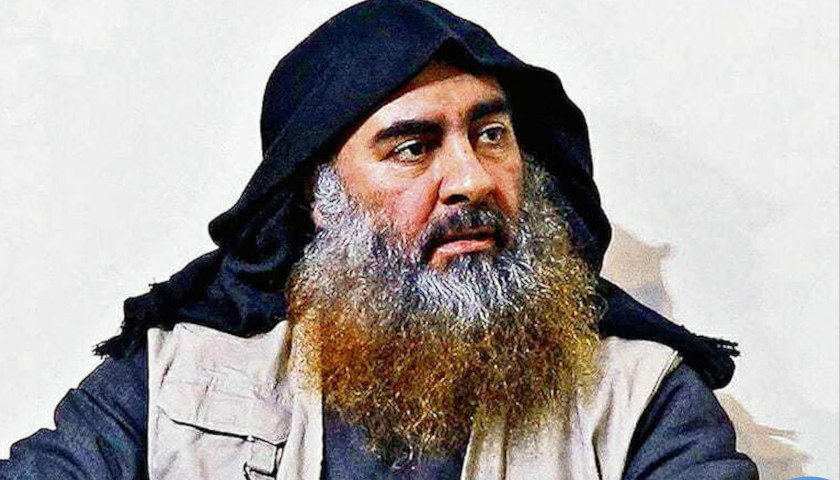by Jeff Seldin
WASHINGTON – Some Islamic State supporters are starting to rally around the terror group’s new leader, using social media to pledge their allegiance to a man whose true identity may not be known for some time.
IS announced the selection of Abu Ibrahim al-Hashimi al-Qurashi as its new leader Thursday in an audio message issued by its Amaq news agency and read by the group’s new spokesman.
“He is a flag of the flags of jihad, and a scholar of its scholars, and an emir of the emirs of war,” the voice said, according to a translation by SITE Intelligence, which monitors jihadist communications.
Qurashi “has attacked the protector of the Cross America, and made it taste bad,” the voice added.
The announcement, which also confirmed the deaths of IS’s self-declared caliph, Abu Bakr al-Baghdadi, and his spokesman, Abu Hassan al-Muhajir, caused what some analysts described as a ripple of excitement on social media and online messaging boards frequented by IS supporters.
Here it begins https://t.co/EHT3KhtSKo pic.twitter.com/zle0RnMfzn
— Tore Refslund Hamming (@ToreRHamming) October 31, 2019
“We give bay’ah [allegiance] to Amir al-Muminin, the Khalifah of the Muslims, Abu Ibrahim al-Hashimi al-Qurashi, pledging to listen and obey,” read one message being posted by IS-affiliated channels.
New leader chosen
Word that IS had chosen a new leader came less than 24 hours after U.S. military officials released the first video of the special forces raid this past Saturday that killed al-Baghdadi as he sought refuge in a compound in Syria’s Idlib province, just a few kilometers from the Turkish border.
“I can tell you this. He crawled into a hole with two small children and blew himself up,” U.S. General Kenneth McKenzie, who oversaw the operation, told reporters of Baghdadi’s last moments.
Until now, IS officials had said nothing about the raid that killed five other IS members, or about a follow-on operation in the Syrian town of Jarablus that killed Baghdadi’s spokesman.
But in Thursday’s announcement, new IS spokesman Abu Hamza al-Qurashi cautioned the U.S. against rejoicing.
“You have become the joke of the nations,” he said. “Your fate [is] controlled by a stupid old man who goes to sleep with one opinion and wakes up with another. Do not be too happy or arrogant. Do you not realize, O America, that the Islamic State today stands at the threshold of Europe and Central Africa? It is expanding and remaining.”
The insults and threats came as little surprise to U.S. military and intelligence officials, who said they expected IS to seek revenge. Nor did they minimize the terror group’s potential to wreak havoc in the Middle East and beyond.
“This is a bureaucracy that’s pretty good at doing succession-planning,” U.S. National Counterterrorism Center acting director Russell Travers told lawmakers in Washington on Wednesday, noting the terror group still commanded at least 14,000 fighters as part of a potent insurgency across Syria and Iraq.
For U.S. intelligence and security officials, a key question now becomes how effective Qurashi will be when it comes to making good on the latest threats, and in keeping IS affiliates and followers from splintering or being poached by rival terror groups like al-Qaida.
Answering it will be difficult.
Who is Abu Ibrahim al-Hashimi al-Qurashi?
Other than his kunya, or nom de guerre, and references in Thursday’s announcement to his religious and military credentials, little is known for certain about Qurashi.
Some officials and analysts have speculated that he may be Hajji Abdallah, one of IS’s most senior ideologues.
Also known by other aliases, including Amir Muhammad Said Abdal-Rahman al-Mawla, he is a religious scholar who rose through the group’s ranks and is thought to have been one of the architects of the slaughter and abduction of the Yazidi religious minority.
Another name that has come up is Abdullah Qardesh, said to be a former Iraqi military officer who spent time with Baghdadi at Camp Bucca, the U.S.-run prison in Iraq that housed jihadists following the Iraq War. Scholars disagree over whether Qardesh is a separate person or just another alias for Abdallah.
“We might never have 100% confirmation, in the near term, at least,” said Aaron Zelin, a fellow at the Washington Institute for Near East Policy. “There was not actual 100% confirmation of who Abu Bakr al-Baghdadi was until he actually went up the stairs of the minbar [preaching platform] in Mosul in 2014. For the first four years of his rule, he [Baghdadi] never showed his face.”
That ability to remain so secretive most likely helped play to Baghdadi’s advantage, allowing him to lead IS for nearly a decade, despite being the target of an ongoing manhunt by U.S. and allied forces.
For that reason, analysts argue, it is unlikely Qurashi will be any more of a public figure than his predecessor.
Challenges ahead
In the meantime, some analysts see Thursday’s announcement as a sign that IS will not be crippled by Baghdadi’s death.
“Despite its leadership decapitation, by announcing this new leader was chosen by a Shura council, it’s showing that bureaucracy is still in place,” said Devorah Margolin, a senior research fellow with the Program on Extremism at George Washington University. “It’s not about the person. It’s about the group.”
Still, there will be challenges for Qurashi as he begins to lead.
“Establish a proto-state, military success and victories on the battlefield,” said Colin Clarke, a senior research fellow at the Soufan Center. “ISIS doesn’t have any of that working in its favor right now.”
But until this past Saturday, it did have Baghdadi.
“He was a big part of the brand,” Clarke said. “There’s this cult of personality that served to really motivate individuals and inspire recruits to travel to come join the caliphate.”
– – –
Photo “Abu Ibrahim al-Hashimi al-Qurashi” by VOA News.







That’s ok. U.S. Special Forces need steady work.